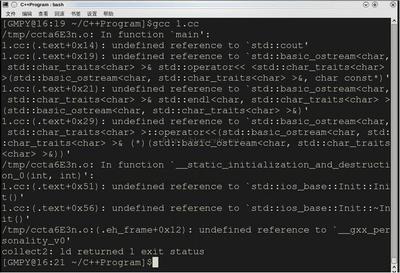误区一: gcc 只能编译 C 代码,g++ 只能编译 C++代码
两者都可以,但是请注意:
1. 后缀为 .c 的,gcc 把它当作是 C 程序,而 g++ 当作是 C++ 程序;
后缀为.cpp的,两者都会认为是 C++程序;
注意: 虽然 C++ 是C 的超集,但是两者对语法的要求是有区别的! C++ 的语法规则更加严谨一些。
例如:
#include<stdio.h>
int
main( int argc,
char *argv[] )
{
if ( 0 == argv )
{
return;
}
printString( argv );
return;
}
int
printString( char* string )
{
sprintf( string,
"This is a test.n" );
}
如果按照 C 的语法规则,OK,没问题,但是,一旦把后缀改为 .cpp,立刻报三个错:
“printString未定义”;
“cannot convert `char**' to `char*”;
“return-statement with no value”;
可见C++的语法规则更加严谨一些。
2. 编译阶段,g++ 会调用 gcc,对于 C++ 代码,两者是等价的,
但是因为 gcc命令不能自动和 C++ 库链接,所以通常用 g++ 来完成链接,
为了统一,干脆编译与链接统统用 g++ 了,就给人一种错觉,好像 cpp 程序只能用 g++ 似的。
误区二: gcc 不会定义 __cplusplus 宏,而 g++会
实际上,这个宏只是标志着编译器将会把代码按 C 还是 C++ 语法来解释,
如上所述,如果后缀为 .c,并且采用 gcc 编译器,则该宏就是未定义的,否则,就是已定义。
误区三: 编译只能用 gcc,链接只能用g++
严格来说,这句话不算错误,但是它混淆了概念,应该这样说:
编译可以用 gcc 或 g++,而链接可以用 g++ 或者 gcc -lstdc++。

因为 gcc 命令不能自动和 C++ 库链接,所以通常使用 g++ 来完成链接。
但在编译阶段,g++ 会自动调用 gcc,二者等价。
误区四: extern "C" 与 gcc 或 g++有关系
实际上并无关系,
无论是 gcc 还是 g++,用 extern "c" 时,都是以 C 的命名方式来为 函数 命名,
否则,都以 C++ 方式为 函数 命名。
试验如下:
test.h:
extern "C" void CppPrintf(void);
test.cpp:
#include <iostream>
#include "test.h"
using namespace std;
void
CppPrintf( void )
{
cout << "Hellon";
}
main.cpp:
#include <stdlib.h>
#include <stdio.h>
#include "test.h"
int
main( void )
{
CppPrintf();
return0;
}
1. 先给 test.h 里的 void CppPrintf(void); 加上 extern "C",看用 gcc 和 g++命名有什么不同。
$ g++ -S test.cpp
$ less test.s
.globl CppPrintf<-- 注意此函数的命名
.typeCppPrintf, @function
$ gcc -S test.cpp
$ less test.s
.globl CppPrintf<-- 注意此函数的命名
.type CppPrintf, @function
完全相同!
2. 去掉 test.h 里 void CppPrintf(void); 前面的 extern "C",看用 gcc 和 g++命名有什么不同。
$ g++ -S test.cpp
$less test.s
.globl_Z9CppPrintfv<-- 注意此函数的命名.type_Z9CppPrintfv,@function
$ gcc -S test.cpp
$ less test.s
.globl_Z9CppPrintfv
.type _Z9CppPrintfv, @function
完全相同!结论:
完全相同,可见 extern "C" 与采用 gcc 或 g++ 并无关系,
以上的试验还间接的印证了前面的说法:在编译阶段,g++ 是调用 gcc 的。
 爱华网
爱华网



